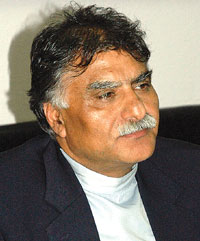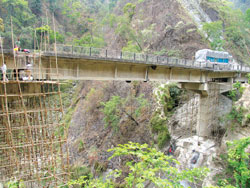|
|
| HARDER TO REBUILD: A strategic bridge at Sarai Naka in Kapilbastu that the Maoists tried to blow up three times was once again being rebuilt in April. |
It's clear even in Kathmandu that the dividends of the year-old peace process are slow-yielding. Out in the districts, the pace seems glacial.
Some things have undoubtedly improved. "The psychological part of the peace dividend is intangible, but it's there. People are moving freely and those who were displaced are returning to their villages," says Jagdish Chandra Pokhrel, vice chairman of the National Planning Commission (see interview, below).
The availability and quality of services such as healthcare, communications, and education have improved in some districts. In Karnali, about 1,000 Maoist cadres have returned to school. In Jumla things are getting rapidly better with the area health posts and sub-posts, veterinary posts, and police and communications post being re-established, says Meghraj Neupane, a local development worker.
But these are the exceptions. In most districts, local bodies are still not up and running, with VDC secretaries striking, being threatened or locked out, or being arbitrarily transferred. The murder last week of a secretary in Siraha has had a ripple effect and shut down local government offices in as many as eight surrounding districts.
Many districts have no Local Development Officers (LDO). When we rang the Kanchanapur LDO's office earlier this week, a clerk told us that the officer, who was appointed in June, hasn't arrived yet. In Parbat, seven LDOs have come and gone in less than a year, transferred according to the whims of the central government.
Particularly in remote districts, people continued to be deprived of basic services as a direct result of lack of local governance. For weeks there has been a crippling food shortage in Kalikot. In Mugu and Humla, health posts have been restored, but health workers have not, says Aruna Uprety who just returned from running medical camps in the far-west.
Non-state agencies have returned to the accessible areas, but complain that now they cannot move freely due to the innumerable bandas. "The continuing shutdowns have seriously affected our work and that of our partners," says Beena Kharel of the Lutheran World Federation, which works in 16 districts across the country.
The bandas are one symptom of the biggest obstacle to resuming development. The Maoists remain the only visible party force in many district headquarters and VDCs. People in the districts find this less than assuring. "We don't have to get permission from the Maoists anymore to run our programs or to travel, but people are still wary of them," says Madhav Raj Neupane a program coordinator with the Karnali Intergrated Rural Development and Research Centre in Nepalganj. Another local NGO worker adds: "People can't trust the Maoists when it looks as if the other parties are still too scared to come out."
The Comprehensive Peace Agreement required that local bodies be reconstituted through political consensus. Eight months after the deal was signed, this has still not happened. The failure to reach a consensus on the political leadership of the local bodies means budgets cannot be made and projects cannot be started.
Minister for Local Development and Works Deb Gurung says an eight-party consensus on development committees at the village and district levels is in the offing, but cannot give us a timeframe. "People are increasingly frustrated," says Arjun Karki, president of the NGO Federation. Government officials insist development is sluggish because agencies are in wait-and-watch mode until the elections to the constituent assembly.
Meanwhile, money and international NGOs keep coming in. In 2006-07 Nepal received aid and grants worth about Rs 12 billion for development work, up from Rs 4 billion the previous year. In the past 11 months, 51 new INGOs have registered with the Social Welfare Council, increasing the number to 180. While local development workers struggle to understand how any of this translates into better service delivery, government officials are waiting for more. "This is insubstantial compared to what other post-conflict countries get," one said.
For now, many Nepalis are just waiting for campaigning to begin, hoping some of the flurry of election promises will take the form of immediate changes.
See also, 'Cost of conflict', Book Review?
"Too little, too slow"
Jagdish Pokhrel, vice chairman of the National Planning Commission, spoke with Nepali Times about the pace of development in the districts.
Nepali Times: Has development resumed in the districts now? 
KIRAN PANDAY
Jagdish Pokhrel: The situation is moving smoothly towards normalisation, though not at the rate it was expected. Since the peace agreement, there are some positive indications, but the all-party committees that were supposed to be formed in the districts are not in place yet.
Is the peace process failing ordinary people?
One part of the peace dividend is psychological-people are moving freely and those who were displaced or who left have come back. They feel more comfortable. People are overcoming the past.
If development work is an indication of a peace dividend, that process has just started. Infrastructure is being rebuilt, but whether this rebuilding is helping people depends on the context.
If we compare our situation with other post-conflict countries, perhaps we have not delivered the kind of peace dividend we should have. This is because the peace process is ongoing, and many things have not been settled yet, and will take until after the elections. The international community has not come through in as big a way to help as we had hoped either.
There is also a gap between the state apparatus and the people. When the local bodies can bridge that gap, the situation will move closer to normal.
How will the momentum for elections affect development work?
It will build confidence and make it easier for other actors, state development agencies, and NGOs to go out and work. Even where there are disturbances, like in some parts of the tarai, development agencies can move with the political parties. The constituent assembly process will speed things up too. Eventually, politicians will be using development work to reach out to the people.



